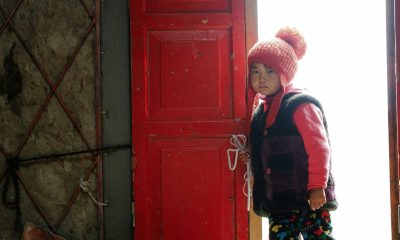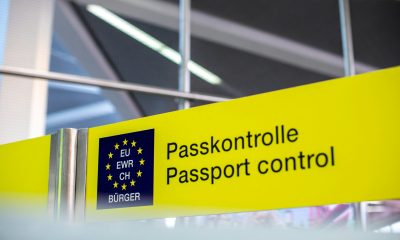Europos Parlamentas
Konferencija apie Europos ateitį: kas tai yra ir kaip ji veiks?

The Conference on the Future of Europe is a chance for Europeans to influence where the EU is heading. Find out what to expect, ES reikalai.

Pasaulyje, kovojančiame su pandemija ir ieškančiu ilgalaikių problemų, tokių kaip klimato kaita, sprendimų, ES yra įsipareigojusi atviroms, demokratinėms diskusijoms su žmonėmis apie tai, į ką ji turėtų sutelkti dėmesį.
Įtraukiantis, demokratinis procesas
A Neseniai atlikta Eurobarometro apklausa parodė, kad 92% europiečių nori, kad į žmonių balsus „būtų labiau atsižvelgta priimant sprendimus dėl Europos ateities“. Konferencija siekia, kad tai įvyktų.
The European Parliament, the European Commission and the Council invite all Europeans to share their ideas about how Europe should evolve, what the priorities should be and how to prepare for a post-Covid world. The EU institutions want to consult as many people as possible, with a special focus on young people.
The Conference will be more than a listening exercise. The contributions that people make in the coming months will be collected on the internetinė platforma and will feed into debates with MEPs, members of the national parliaments, government and EU representatives, as well as other stakeholders. These debates will become the foundation for policy proposals that will then be turned concrete EU action. Parliament, the Commission and the Council pasižadėjo išklausyti žmonių pasiūlymus ir tęsti konferencijos rezultatus.
All Europeans are welcome to take part in this process, regardless of their age, gender, education or professional background. Parliament wants to especially ensure the active participation of young people and will use its regular European Youth Event (EYE) in October 2021 to gather their visions on Europe’s future.
Kaip tai veiks?
Buvo paleista skaitmeninė konferencijos platforma on 19 April. It allows people to share and discuss ideas online as well as prepare events across the EU, where and when the health conditions allow. These events will serve as another source of ideas for change. The member states will also organise citizen-driven events.
After the summer, European citizens’ panels bringing together people from different walks of life will look at the ideas put forward. There will be four citizens’ panels of 200 members each working on different themes:
- European democracy and values, rights, rule of law, security
- Klimato kaita, aplinka ir sveikata
- Stipresnė ekonomika, socialinis teisingumas, darbo vietos, švietimas, jaunimas, kultūra, sportas ir skaitmeninė sritis
transformacija - ES pasaulyje ir migracija
Each of the panels will meet at least three times and will be free to define its priorities. Their recommendations will be presented to the Conference Plenary.
The Conference Plenary has a central role in the Conference as representatives of the EU institutions, the governments and civil society will meet there with citizens to discuss and develop proposals for change. The European Parliament pushed for a politically strong Plenary with many elected representatives as well as for an important role of citizens.

The inaugural plenary session will take place on 19 June in Strasbourg with remote and physical participation. More sessions will follow in the autumn and the winter to discuss the proposals coming from the citizens’ panels.
Sužinokite, kas yra Europos Parlamento atstovai konferencijos plenariniame posėdyje.
Vykdomoji valdyba yra atsakinga už konferencijos veikimą. Ją sudaro Europos Parlamento, Tarybos ir Komisijos atstovai bei stebėtojai.
Kas išeis iš konferencijos?
The outcome will depend on the proposals that people make and the subsequent debates.
The final report will be drawn up by the executive board based on proposals approved by the Conference Plenary. The report will be prepared in full collaboration with the Plenary and will have to receive its approval. It will then be submitted for follow-up to the European Parliament, the Council and the Commission.
Parlamentas pabrėžė, kad konferencija turėtų realiai paveikti tai, kaip ES yra įsteigta ir ką ji daro, kad žmonių balsai ir rūpesčiai būtų ES politikos ir sprendimų centre.
Pasidalinkite šiuo straipsniu:
-

 Iranasprieš 4 dienas
Iranasprieš 4 dienasKodėl dar neatsižvelgta į ES parlamento raginimą įtraukti IRGC kaip teroristinę organizaciją?
-

 Brexitprieš 3 dienas
Brexitprieš 3 dienasNaujas tiltas jauniesiems europiečiams abiejose Lamanšo sąsiaurio pusėse
-

 Kirgizijaprieš 4 dienas
Kirgizijaprieš 4 dienasMasinės Rusijos migracijos įtaka etninei įtampai Kirgizijoje
-

 Imigracijaprieš 4 dienas
Imigracijaprieš 4 dienasKokie yra valstybių narių išlaikymas be sienų zonos


























